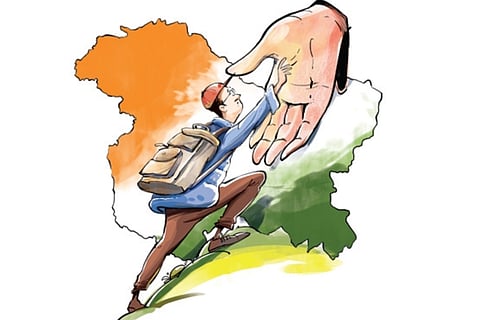

Meadows I cover with flowers for you, Come, my lover of flowers!
Come, let me gather fresh jasmine for you,
Never return these hours!
Lilacs have bloomed by the river for you, Deeply the world is asleep, Still, though, no answer has reached me from you, Garlands of green I keep.
What if they speak only evil of me?
Who has been able to change destiny?
Come, my lover of flowers!
These lyrics of 16th century Kashmiri poetess Habba Khatoon are like balm on a wounded soul. In the lush green valley, where the Lidder river flows like a reckless young woman in the laps of the snowy mountains, the blood of the dead, killed mercilessly on the afternoon of April 22 in the Baisaran meadows will never dry.
The 26 tourists — all men, young, middle aged and senior citizens — were shot dead by armed terrorists, who emerged from behind the thick woods and sullied the pristine air of the Valley forever. There were families, honeymooning couples, who had just tied the knot and had come to Kashmir to celebrate their wedding.
That afternoon, it was as if people from across India had gathered in the meadows of Pahalgam to holiday. The victims included Sudip Neupane from Nepal, Syed Adil Hussain Shah, the guide and ponywallah and the lone bread winner of his family from Pulwama. There were six men from Maharashtra, three each from Gujarat and Karnataka, two from Bengal and one each from Uttarakhand, Uttar Pradesh, Haryana, Punjab, Bihar, Madhya Pradesh, Arunachal Pradesh, Odisha, Andhra Pradesh and Kerala.
Women and children, including teenage boys, who saw their husbands, fathers and uncles being killed by gun-toting soulless men as they begged for mercy have returned home with a loss that none can fill and a void that stares at them like a harrowing memory.
These are survivors of the tragedy that has come to haunt Kashmir after a long time since the abrogation of Article 370 in August 2019. Kashmir has risen in one voice against the terrorists’ attempt to defile its name and land and have held protests against Pakistan and its nefarious designs to cut into the crown of India.
For all the survivors, despite their individual and collective pain they have carried home memories of Kashmiri men, who helped them at the cost of their lives. Adil had left home early that morning as usual to take tourists to Baisaran, which is accessible only by foot or horseback. He never returned home that evening with the `300-`400 daily earnings that would fetch some rice for the family and medicines for his ailing father.
Adil took three bullets when he tried to snatch the firearm from one of the attackers while trying to save the lives of Kaustubh Ganbote and Santosh Jagdale from Maharashtra. The two men were not spared the bullets either, but not before Adil put himself in front of them. The bullets pierced his body and sucked the young braveheart’s life away.
Sajjad Ahmed Bhatt, who was attending the funeral of his aunt near to the attack site, rushed as soon as heard of it and the video of him climbing down steadfastly the hilly terrain with a wounded boy on his back has become the anthem of India’s unity in diversity, humanity and heroism in the face of the gun. Wasn’t he scared for his life when he ran to rescue the victims? His answer was that it was his duty to do so.
“Insaniyat sabse bada mazhab hai (humanity is the biggest religion),” said Bhatt. He humbly added that there were other ponywallahs who had rushed to rescue people.
Rubeena and Mumtaza, the teenagers from the Gujjar Bakarwal community, ran to save the lives of some tourists, including a child. They offered shelter and water in their mud house, and guided them to a place of safety. This is what the terrorists, the conspirators and handlers from across the border will neither understand, nor will they be able to comprehend the spirit of India and its heroes.
The survivors have reached home, most of them with coffins of their loved ones. In the searing pain and agony of loss, they remember the brotherhood of Kashmir.
Arathy Sarath from Kerala, whose father N Ramachandran was shot dead remembers local drivers Musafir and Sameer, who drove her and her children to safety.
In this tragedy, Kashmir has given me two brothers, she said.